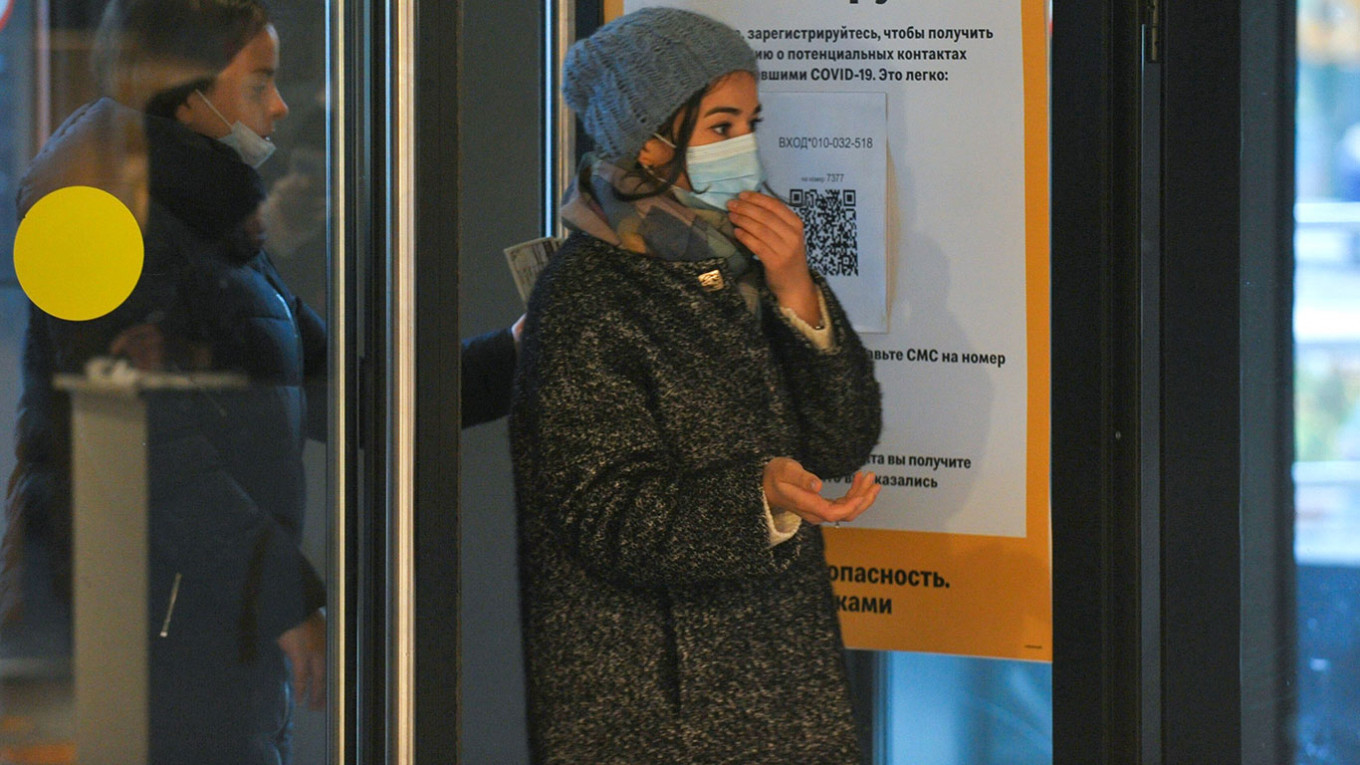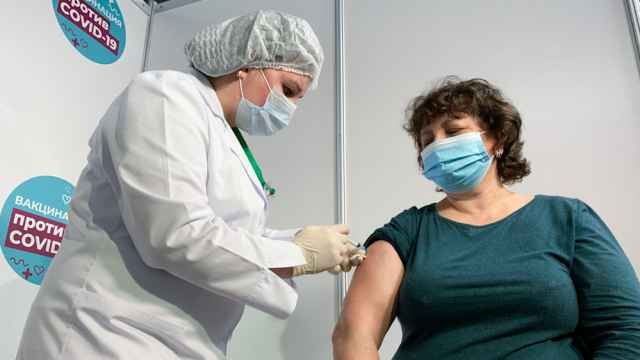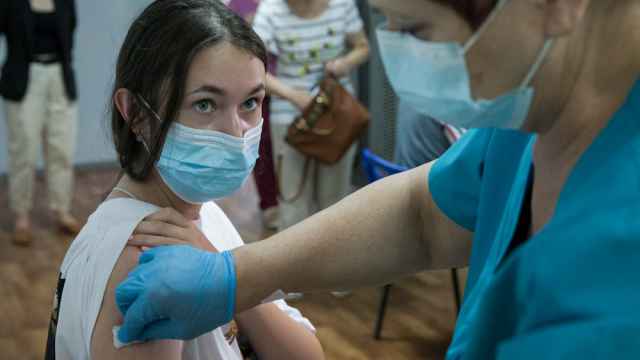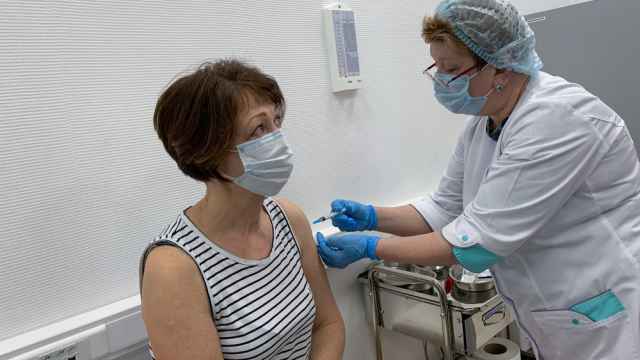Russia’s rollout of a nationwide QR code system that would restrict access to public places and transport to encourage vaccination is running into widespread opposition from anti-lockdown activists, even as Russia’s pandemic death toll continues to soar.
With vaccine skepticism rife and only around 35% of Russians having received their jabs, moves to make jabs all but obligatory have been met with dismay, as polls show almost half of the population opposing the use of QR codes under any circumstances.
“Forcing people to get vaccinated through QR codes violates at least six articles of the Russian Constitution,” said Yevgeny Stupin, a Communist member of the Moscow City Duma who has campaigned against Covid restrictions.
“What the government is doing is unacceptable and criminal,” he added.
But with an end to Russia’s pandemic nowhere in sight and the country’s excess mortality among the world’s highest, anger at fresh public health restrictions is unlikely to force the Kremlin to abandon them.
The QR code program is the culmination of almost a year’s worth of failure to persuade Russians to get vaccinated.
Though jabs have been widely available across the country since late last year, uptake has been low with a consistent majority of Russians telling pollsters that they do not want a vaccine.
As case numbers have ebbed and flowed, regional authorities have occasionally resorted to harsh measures to encourage vaccination.
A short-lived QR code program in Moscow in the summer was quickly abandoned amid opposition from restaurateurs.
Eye catching stunts like the Far Eastern Khabarovsk region raffling off three tons of coal to the newly vaccinated have likewise failed to put a dent in opposition to inoculation.
However, with Russia’s pandemic excess death toll hitting 723,000 in November, the world’s third highest per-capita rate, the Kremlin was left with no choice but to take more decisive action.
“At first we thought that the pandemic would end in six months, or in a year,” Vladimir Putin’s spokesman Dmitry Peskov told journalists in mid November.
“Now we see that we were wrong in our calculations. The pandemic has already lasted for two years, and so far there is no end in sight.”
A bill introduced to Russia’s State Duma this month would make QR codes mandatory for access to public places and long-distance transport across the country.
Some regions have already introduced their own local restrictions, with Kazan banning the unvaccinated from public transport, a move that local anti-QR code activists are appealing in court.
A poll for the Superjob recruitment website showed 70% of Russians opposed to mandatory QR codes on public transport, substantially more than are personally opposed to vaccination.
The business daily RBC has reported that the Kremlin is contemplating rebranding QR codes as “health passes” or “CoviPasses,” believing that the phrase itself has become toxic amid the controversy.
Throughout the country, the QR plans have elicited a wave of activism.
Though social networks like Russia’s Facebook equivalent VKontakte and the encrypted messenger service Telegram have played host to anti-vaccine and anti-lockdown content since the beginning of the pandemic, discontent has rarely spilled into the offline world.
The introduction of QR codes, however, has seen a number of small protests in provincial cities, from Yekaterinburg in the Urals, to Volgograd in the south and Kamchatka in the Far East.
And in the Urals city of Chelyabinsk, anti-QR code protesters attempted to storm the regional legislature while lawmakers were discussing introducing the region’s own restrictions.
For experts, the authorities’ light-touch response to the unrest — especially when compared with the harsh crackdowns inflicted on opposition protests earlier this year — reflects the realities of governing a majority anti-vaccine country.
“For the Kremlin, anti-vaccine protests are considered legitimate social discontent,” said Tatiana Stanovaya, founder of R.Politik, a political consultancy.
“Anti-vaxxers are seen as potentially part of Putin’s electorate. The government would rather calm them down than crack down hard.”
The Meduza news site has reported that the Kremlin is keen to distance Putin personally from unpopular pandemic policies, fearing that they might impact on his standing with the public.
Political establishment
An altogether different problem is the increasing prominence of anti-vaccine and anti-QR code sentiment within the established political field.
Elements of the Russian political establishment have exploited the unpopularity of pandemic measures to their own gain.
The success of Russia’s Communist Party parliamentary opposition in the September State Duma elections came on the back of a campaign that flirted with vaccine conspiracy theories and compared QR codes to Tsarist-era serfdom.
Last week, the local legislature in North Ossetia — a Caucasian republic with the second lowest vaccination rate of any Russian region — rejected a government-backed bill establishing a local QR code regime.
Though the legislature reconvened only hours later, and voted through the resubmitted bill, a string of deputies — including the local United Russia leader — resigned in protest.
For R.Politik’s Stanovaya, the Kremlin’s hope is that by taking a gradual approach to the QR code issue, the population will become accustomed to the new restrictions and vaccination will gradually tick up.
But with baseless anti-vaccine conspiracy theories still enjoying wide credence among the Russian population, it is unclear whether mandatory QR codes will break down the population’s deep-seated resistance to jabs.
“These vaccines are still completely untested,” said Communist lawmaker Yevgeny Stupin, who has himself declined to be vaccinated.
“It’s absolutely inhuman to force people to take a vaccine that’s still only in its trial phases.”
A Message from The Moscow Times:
Dear readers,
We are facing unprecedented challenges. Russia's Prosecutor General's Office has designated The Moscow Times as an "undesirable" organization, criminalizing our work and putting our staff at risk of prosecution. This follows our earlier unjust labeling as a "foreign agent."
These actions are direct attempts to silence independent journalism in Russia. The authorities claim our work "discredits the decisions of the Russian leadership." We see things differently: we strive to provide accurate, unbiased reporting on Russia.
We, the journalists of The Moscow Times, refuse to be silenced. But to continue our work, we need your help.
Your support, no matter how small, makes a world of difference. If you can, please support us monthly starting from just $2. It's quick to set up, and every contribution makes a significant impact.
By supporting The Moscow Times, you're defending open, independent journalism in the face of repression. Thank you for standing with us.
Remind me later.







